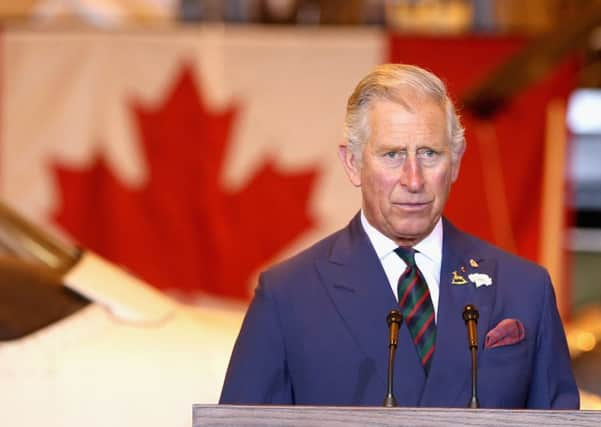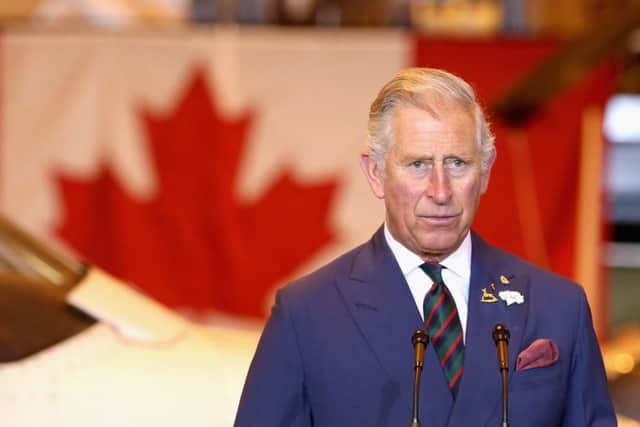Prince Charles compares Vladimir Putin to Hitler


One MP said Charles should abdicate if he wanted to speak out on international issues, but Deputy Prime Minister Nick Clegg insisted that the heir to the throne should be “free to express himself”.
Charles apparently added his voice to international anger from the West at Russia’s actions in Ukraine during his tour of Canada, when he spoke to a woman who fled the Nazis and lost family members during the Holocaust.
Advertisement
Hide AdAdvertisement
Hide AdHis remark came during a tour of the Museum of Immigration in Halifax, Nova Scotia, where the Prince and the Duchess of Cornwall paid tribute to Second World War veterans and their families.


Jewish museum volunteer Marienne Ferguson told the Prince that she fled to Canada with her family shortly before the Nazis annexed the Baltic coastal Free City of Gdansk in 1939.
After meeting Charles, Mrs Ferguson, 78, told the Daily Mail: “The Prince said ‘And now Putin is doing just about the same as Hitler’.
“I must say that I agree with him and am sure a lot of people do.
“But I was very surprised that he made the comment as I know they (members of the Royal Family) aren’t meant to say these things.
“I told the Prince that while my family and I were lucky to get a permit to travel, many of my relatives had permits but were unable to get out before the war broke out on September 1.
“They were sent to the concentration camps and died.”
The comments came just over a fortnight before Charles is due to meet Mr Putin at the commemorations of the 70th anniversary of the D-Day landings in Normandy on June 6.
He and the Duchess are currently on a four-day tour of Canada.
Advertisement
Hide AdAdvertisement
Hide AdLabour MP Mike Gapes, a current member and former chairman of the House of Commons Foreign Affairs Committee, condemned the Prince’s comments.
The Ilford South MP said on Twitter: “If Prince Charles wants to make controversial statements on national or international issues, he should abdicate and stand for election.
“In a constitutional monarchy, policy and diplomacy should be conducted by Parliament and government. Monarchy should be seen and not heard.”
But Mr Clegg said Charles was “free to express himself”.
“I have never been of this view that if you are a member of the Royal Family, somehow you have to enter into some Trappist vow of silence,” the Deputy Prime Minister told BBC1’s Breakfast.
“I think he is entitled to his views. But I don’t know whether those were his views because I just don’t think providing a running commentary on what were private conversations is useful to anybody.
“I don’t know exactly what he did or didn’t say in that conversation because he thought it was a private conversation.”
Asked if he agreed there were parallels to be drawn between Mr Putin and Hitler, Mr Clegg said: “I’m not going to start comparing one period of European history to another.
“People can make different comparisons from different periods of history if they wish. All I would say is that right now I think the behaviour of Putin is not only menacing to Ukraine but it is very destabilising for Europe more generally.
Advertisement
Hide AdAdvertisement
Hide Ad“That is why we continue to say to the Russians, continue to say to Vladimir Putin: step back, de-escalate. It’s not in Russia’s interests, let alone anybody else’s, to continue ratcheting up this tension.”
A spokesman for Clarence House said: “We do not comment on private conversations. But we would like to stress that the Prince of Wales would not seek to make a public political statement during a private conversation.”
The comments are not the first time the Prince has commented on political affairs.
Letters he wrote to a number of government departments between 2004 and 2005 are the subject of a legal battle over whether their contents should be disclosed.
The Guardian has been trying to make the letters public under the Freedom of Information Act and in September 2012 the High Court ruled in its favour.
The newspaper said the battle was being fought to shed more light ‘’on the way the heir to the throne seeks to influence government ministers even though he holds no elected position’’.
But Attorney General Dominic Grieve has attempted to block the release of the letters, claiming they undermine the principle of the heir to the throne being politically neutral.
In February the Prince spoke out about the winter flooding on the Somerset Levels, calling it a “tragedy” that “nothing happened for so long”.
Advertisement
Hide AdAdvertisement
Hide AdAnd in 2010 he attracted criticism for expressing strong opinions on a multimillion-pound plan for Chelsea Barracks in London, telling the prime minister of Qatar - who was chair of the developers - that his ‘’heart sank’’ when he saw the design by architect Lord Rogers.